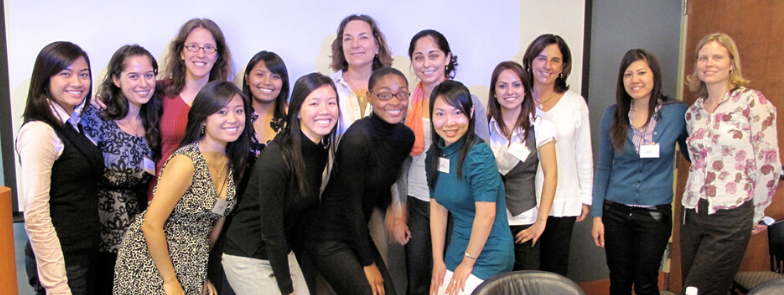Fascinating Science: The Women’s Health Undergraduate Research Internship

Camille Roque researched disparities in the availability of minimally invasive gynecological surgeries among hospitals in Northern California.
Thet Wai built a database on outcomes for monochorionic twins with “Twin/Twin Transfusion Syndrome” at UCSF’s Fetal Treatment Center.
Nhi Tran mapped the genetics of primordial germ cell mutations among mice.
And Jennifer Poeng studied the impact of suppression and stimulation on antral follicle counts.
No, these aren't the research projects of UCSF doctoral candidates. Instead, they're the work of four undergraduate women who were among the ten first-ever interns in UCSF’s Women's Health Undergraduate Research Internship (WHURI), which took place this summer.
The program was organized by UCSF’s Department of Obstetrics, Gynecology and Reproductive Sciences, along with the University’s National Center of Excellence in Women's Health. Its aim? To give pre-med students from diverse backgrounds at the University of California at Berkeley (UCB) the opportunity to participate in basic and clinical research in reproductive sciences, as well as exposure to clinical practice in women's health.
Losing Sight of Their Dreams
The idea for the program came when Dr. Patricia Robertson, a professor and director of Medical Student Education in the Department of Obstetrics, Gynecology and Reproductive Sciences, attended hearings as a member of the UC Student Mental Health Committee. There, she realized that there was an early leak in the UC undergraduate pipeline for minority students who planned to become physicians. Too often, these students became discouraged after “weeder” introductory science courses and subsequently let go of their dream to become physicians and serve their communities.
Dr. Robertson combined forces with Dr. Juan Guerra, a staff physician in OB-GYN at Kaiser Permanente and assistant professor on the volunteer clinical faculty at UCSF. Together, they started the WHURI program.
The interns’ stipends were provided by Northern California Kaiser Permanente (which has an interest in increasing the diversity of its physician workforce), as well as from funds from Dr. Robertson’s Endowed Chair in Obstetric and Gynecologic Education (supported by the Academy of Medical Educators at UCSF and her department.)
To find potential summer interns, Robertson and Guerra visited with leaders of the Biology Scholars Program at UCB, which assists students who come from economic, ethnic and cultural groups that traditionally have been underrepresented in the health sciences.
They also targeted other student groups at UC Berkeley, as suggested by the UCSF Medical Student Advisory Group for the WHURI program (comprised of current UCSF medical students who attended UC Berkeley as undergraduates).
“In the first two weeks we received over 100 applications," Robertson says. “We interviewed 20 and chose 10. We felt very bad that we couldn’t take all 100.”
The chosen interns did twenty hours of research a week for nine weeks. When they presented their projects to UCSF staff and faculty in late July, many spoke of their enjoyment of the process.
"I didn't think science and research could be so much fun," Poeng admitted. "I learned that developing a hypothesis, conducting research, and coming to a conclusion is very fascinating."
In addition, the interns attended weekly seminars where they learned about applying to medical school and getting financial assistance, as well as the experiences of some faculty members in the health field.
Finding Inspiration
The interns visited or shadowed doctors for a half day per week in many clinical settings, including Kaiser Oakland/Richmond; New Generations Clinic (which serves teen women); San Francisco General Hospital; and the Lyon-Martin Health Services (which serves lesbian women and others).
Many of the interns spoke of their excitement upon being able to witness real surgeries and births. But for Norma Ruiz, who was born in Mexico and is the first in her family to attend college (she's studying public health with an emphasis on community health), it was the shadowing experience in a clinic that helped her find her passion.
"Latinos make up thirty percent of the population in California, but only five percent of the physicians are Latino," she said during her presentation. "When I was at SFGH, I saw there were many Spanish-speaking patients, but no Latino or Spanish-speaking doctors. I could feel the barrier that forms when the doctor and patient don't speak the same language. I realized how important it is to have doctors who can clearly communicate with their patients. I was inspired and reminded why I have decided to pursue a career in medicine."
Similarly, Marie Palo, who is majoring in molecular and cellular biology and spent the summer researching the effect of the spermicide nonoxynol-9 on the endometrium, said that she was honored to be in the clinic when an Ethiopian woman who had suffered genital mutilation visited a doctor for the first time. "I will never forget her," Palo said. "It was really moving."
Many other interns also found inspiration to continue their medical careers. "I have wanted to be a doctor since I was a child," Tran, a public health major, said during her presentation. "But once I got to UCB, I realized what a privilege it is to get a higher education, and I started working with youth groups, advocating for higher education. I lost my pre-med focus. This internship has re-inspired me to continue toward my career in medicine, and it has made me realize that as a doctor I also can do work in advocacy and public policy."
Noted Roque, a medical toxicology major at UCB: "When I'm slogging through my undergraduate work, I'll now remember why I'm doing it."
